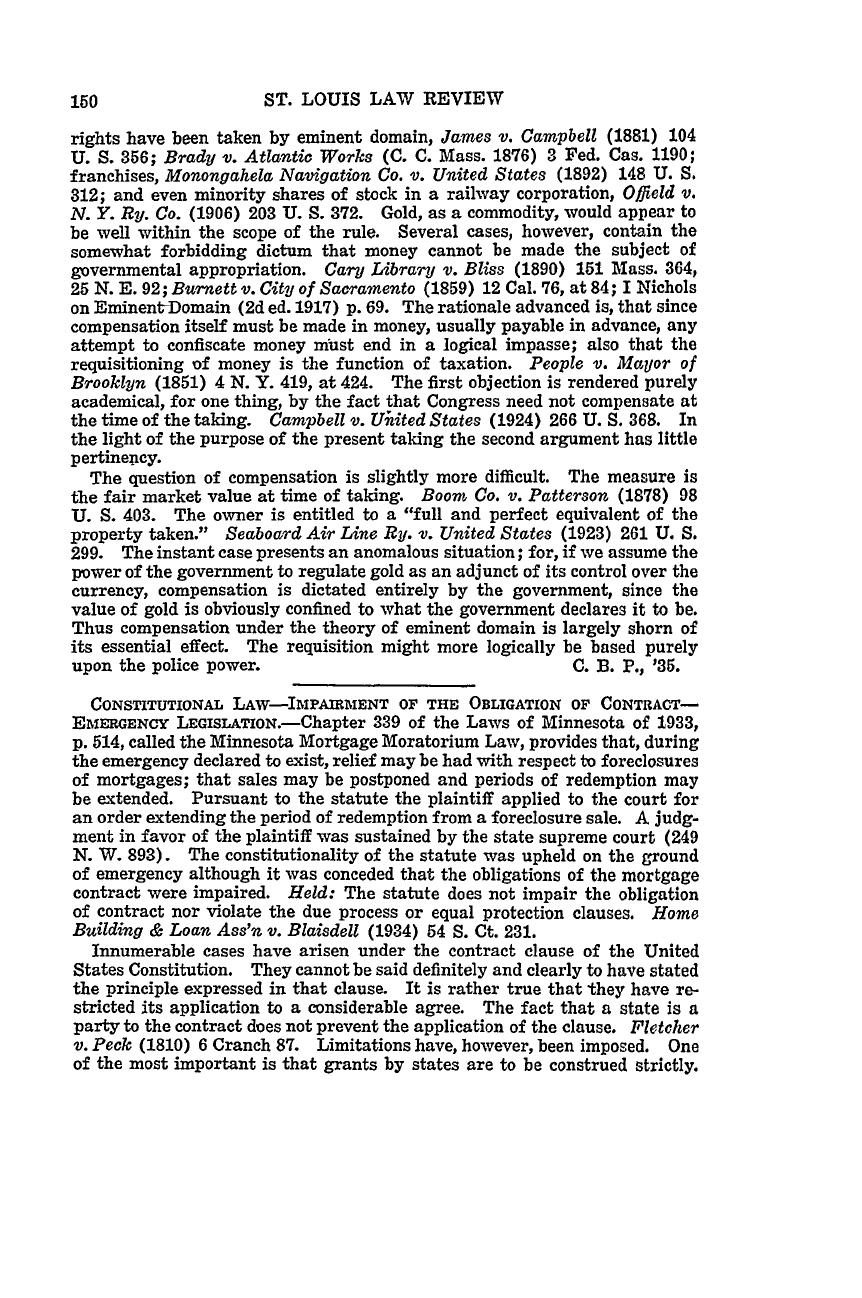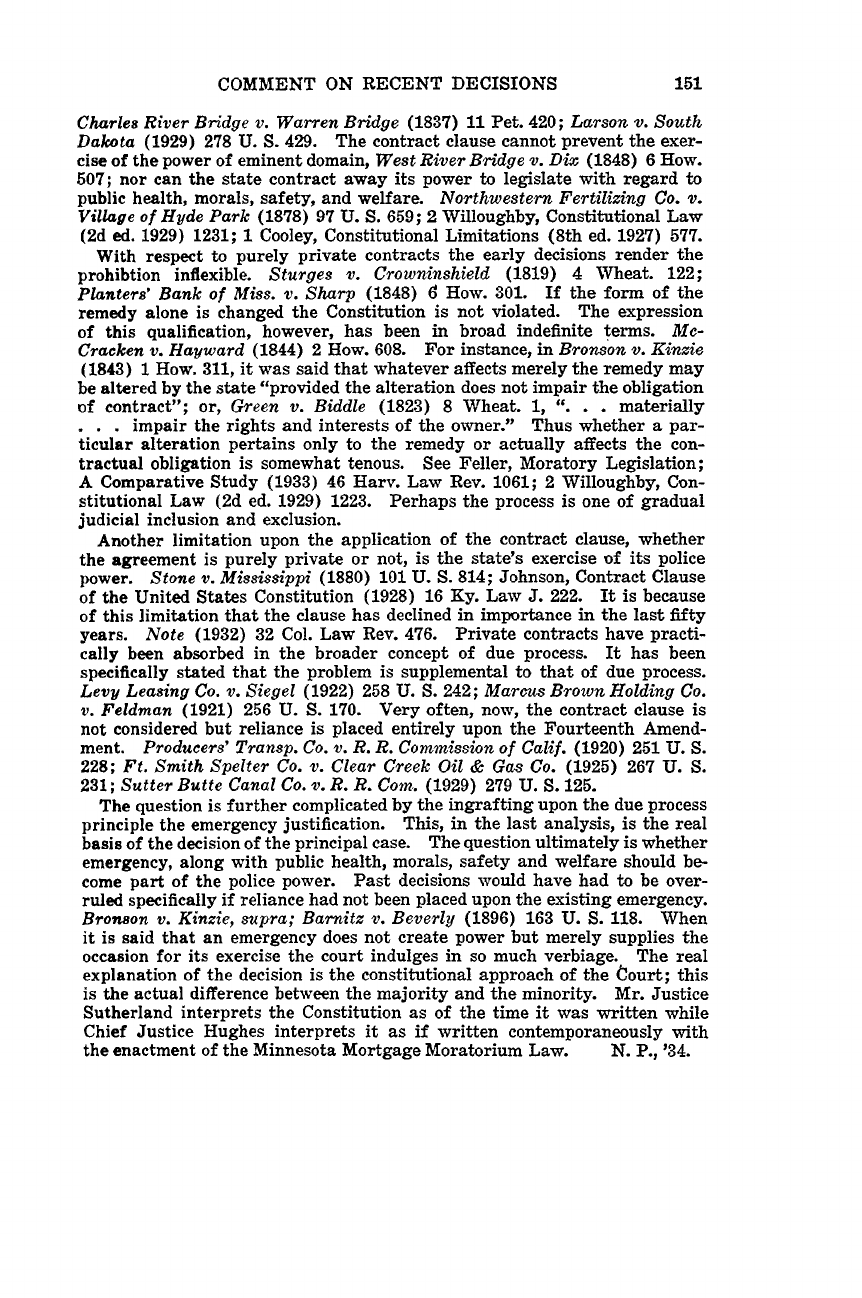
Washington University Law Review Washington University Law Review
Volume 19 Issue 2
January 1934
Constitutional Law—Impairment of the Obligation of Constitutional Law—Impairment of the Obligation of
Contract—Emergency Legislation Contract—Emergency Legislation
Follow this and additional works at: https://openscholarship.wustl.edu/law_lawreview
Part of the Constitutional Law Commons, and the Contracts Commons
Recommended Citation Recommended Citation
Constitutional Law—Impairment of the Obligation of Contract—Emergency Legislation
, 19 ST. LOUIS L. REV.
150 (1934).
Available at: https://openscholarship.wustl.edu/law_lawreview/vol19/iss2/14
This Comment on Recent Decisions is brought to you for free and open access by Washington University Open
Scholarship. It has been accepted for inclusion in Washington University Law Review by an authorized
administrator of Washington University Open Scholarship. For more information, please contact

ST.
LOUIS
LAW
REVIEW
rights
have
been
taken
by
eminent
domain,
James
v.
Campbell
(1881)
104
U.
S.
356;
Brady
v.
Atlantic
Works
(C.
C.
Mass.
1876)
3
Fed.
Cas.
1190;
franchises,
Monongahela
Navigation
Co.
v.
United
States
(1892)
148
U.
S.
312;
and
even
minority
shares
of
stock
in
a
railway
corporation,
Ofield
V.
N.
Y.
Ry.
Co.
(1906)
203
U.
S.
372.
Gold,
as
a
commodity,
would
appear
to
be
well
within
the
scope
of
the
rule.
Several
cases,
however,
contain
the
somewhat
forbidding
dictum
that
money
cannot
be
made
the
subject
of
governmental
appropriation.
Cary
Library
v.
Bliss
(1890)
151
Mass.
364,
25
N.
E.
92;
Burnett
v.
City
of
Sacramento
(1859)
12
Cal.
76,
at
84;
I
Nichols
on
Eminent-Domain
(2d
ed.
1917)
p.
69.
The
rationale
advanced
is,
that
since
compensation
itself
must
be
made
in
money,
usually
payable
in
advance,
any
attempt
to
confiscate money
must
end
in
a
logical
impasse;
also
that
the
requisitioning
of
money
is
the
function
of
taxation.
People
V.
Mayor
of
Brooklyn
(1851)
4
N.
Y.
419,
at
424.
The
first
objection
is
rendered
purely
academical,
for
one
thing,
by
the
fact
that
Congress
need
not
compensate
at
the
time
of
the taking.
Campbell
v.
Uited
States
(1924)
266
U.
S.
368.
In
the light
of
the
purpose of
the present
taking
the
second
argument
has
little
pertinency.
The
question
of
compensation
is
slightly
more
difficult.
The
measure
is
the
fair
market
value
at
time
of
taking.
Boom
Co.
v.
Patterson
(1878)
98
U.
S.
403.
The
owner
is entitled
to
a
"full
and
perfect
equivalent
of
the
property
taken."
Seaboard
Air
Line
By. v.
United
States
(1923)
261
U.
S.
299.
The
instant
case
presents
an
anomalous
situation;
for,
if
we
assume
the
power
of
the
government
to
regulate
gold
as
an
adjunct
of
its
control over
the
currency,
compensation
is
dictated
entirely
by
the
government,
since
the
value
of
gold
is
obviously
confined
to
what
the
government
declares
it
to
be.
Thus
compensation
under
the
theory
of
eminent
domain
is
largely
shorn
of
its
essential
effect.
The
requisition
might
more
logically
be
based
purely
upon
the
police
power.
C.
B.
P.,
'35.
CONSTITUTIONAL
LAW-IMPAIRMENT
OF
THE
OBLIGATION
OF
CONTRACT-
EMERGENCY
LEGISLATION.-Chapter
339
of
the
Laws
of Minnesota
of
1933,
p.
514,
called
the
Minnesota
Mortgage
Moratorium
Law,
provides
that,
during
the
emergency
declared
to
exist,
relief
may
be
had
with
respect
to
foreclosures
of
mortgages;
that
sales
may
be
postponed
and
periods
of
redemption
may
be
extended.
Pursuant
to
the
statute
the
plaintiff
applied
to
the
court
for
an
order
extending
the
period
of
redemption
from a
foreclosure
sale.
A
judg-
ment in
favor
of
the
plaintiff
was
sustained
by
the
state
supreme
court
(249
N.
W.
893).
The
constitutionality
of
the
statute
was
upheld
on
the
ground
of
emergency
although
it
was
conceded
that
the
obligations
of
the mortgage
contract
were
impaired.
Held:
The
statute
does
not
impair the
obligation
of
contract
nor
violate
the
due process
or
equal
protection
clauses.
Home
Building
&
Loan
Ass'n
v.
Blaisdell
(1934)
54 S.
Ct.
231.
Innumerable
cases
have
arisen
under
the
contract
clause
of
the
United
States
Constitution.
They
cannot
be
said
definitely
and
clearly
to have
stated
the
principle
expressed
in
that
clause.
It
is
rather true
that
they
have
re-
stricted
its
application
to
a
considerable
agree.
The
fact
that
a
state
is
a
party
to
the
contract
does
not prevent
the
application
of
the
clause.
Fletcher
v.
Peck
(1810)
6
Cranch
87.
Limitations
have,
however,
been
imposed.
One
of
the
most
important
is
that
grants
by
states are
to
be
construed
strictly.
Washington University Open Scholarship

COMMENT
ON
RECENT
DECISIONS
Charles
River
Bridge
v.
Warren
Bridge
(1837)
11
Pet.
420;
Larson
v.
South
Dakota
(1929)
278
U.
S.
429.
The
contract
clause
cannot
prevent
the
exer-
cise
of
the
power
of
eminent
domain,
West
River
Bridge
v.
Dix
(1848)
6
How.
507;
nor
can
the
state
contract
away
its
power
to
legislate
with
regard
to
public
health,
morals,
safety,
and
welfare.
Northwestern
Fertilizing
Co.
v.
Village
of
Hyde
Park
(1878)
97
U.
S.
659;
2
Willoughby,
Constitutional
Law
(2d
ed.
1929)
1231;
1
Cooley,
Constitutional
Limitations
(8th
ed. 1927)
577.
With
respect
to
purely
private
contracts
the
early
decisions
render
the
prohibtion
inflexible.
Sturges
v.
Crowninshield
(1819)
4
Wheat.
122;
Planters'
Bank
of
Miss.
v.
Sharp
(1848)
8
How.
301.
If
the
form
of
the
remedy
alone
is
changed
the
Constitution
is
not
violated.
The
expression
of
this
qualification,
however,
has
been
in
broad
indefinite
terms.
Mc-
Cracken
v.
Hayward
(1844)
2
How.
608.
For
instance,
in
Bronson
v.
Kinzie
(1843)
1
How.
311,
it
was
said
that
whatever
affects
merely
the
remedy
may
be
altered
by
the
state
"provided
the
alteration
does
not
impair the
obligation
of
contract";
or,
Green
v.
Biddle
(1823)
8
Wheat.
1,
". .
.
materially
. . .
impair the
rights
and
interests
of
the
owner."
Thus
whether
a
par-
ticular
alteration
pertains
only
to
the
remedy
or
actually
affects
the
con-
tractual
obligation
is
somewhat
tenous.
See
Feller,
Moratory
Legislation;
A
Comparative
Study
(1933)
46
Harv.
Law
Rev.
1061;
2
Willoughby,
Con-
stitutional
Law
(2d
ed.
1929)
1223.
Perhaps
the
process
is
one
of
gradual
judicial
inclusion
and
exclusion.
Another
limitation
upon
the
application
of
the
contract
clause,
whether
the
agreement
is
purely
private
or
not,
is
the
state's
exercise
Of
its
police
power.
Stone
v.
Mississippi
(1880) 101
U.
S.
814;
Johnson,
Contract
Clause
of
the
United
States
Constitution
(1928)
16
Ky.
Law
J.
222.
It
is
because
of
this
limitation
that
the
clause
has
declined
in
importance
in
the
last
fifty
years.
Note
(1932)
32
Col.
Law
Rev.
476.
Private
contracts
have
practi-
cally
been
absorbed
in
the
broader
concept
of
due process.
It
has
been
specifically
stated
that
the
problem
is
supplemental
to
that
of due
process.
Levy
Leasing
Co.
v.
Siegel
(1922)
258
U.
S.
242;
Marcus
Brown
Holding
Co.
v.
Feldman
(1921)
256
U.
S.
170.
Very
often,
now,
the
contract
clause
is
not
considered
but
reliance
is
placed
entirely
upon
the
Fourteenth
Amend-
ment.
Producers'
Transp.
Co.
v.
R. R.
Commission
of
Calif.
(1920)
251
U.
S.
228;
Ft.
Smith
Spelter
Co.
v.
Clear
Creek
Oil
&
Gas
Co.
(1925)
267
U.
S.
231;
Sutter
Butte
Canal
Co.
v.
R.
R.
Com.
(1929)
279
U.
S.
125.
The question
is
further
complicated
by
the
ingrafting
upon
the
due
process
principle
the
emergency
justification.
This,
in
the
last
analysis,
is
the
real
basis
of
the
decision
of
the principal
case.
The
question
ultimately
is
whether
emergency,
along
with
public
health,
morals,
safety
and
welfare
should
be-
come
part
of
the
police
power.
Past
decisions would
have
had
to
be
over-
ruled
specifically
if
reliance
had
not
been
placed
upon
the
existing
emergency.
Bronson
v.
Kinzie,
supra;
Barnitz
v.
Beverly
(1896)
163
U.
S.
118.
When
it
is
said
that
an
emergency
does
not
create
power
but
merely
supplies
the
occasion
for its
exercise
the
court
indulges
in
so
much
verbiage.
The
real
explanation
of
the
decision
is
the
constitutional
approach
of
the
lbourt;
this
is
the
actual
difference
between
the
majority
and
the
minority.
Mr.
Justice
Sutherland
interprets
the
Constitution
as of
the
time
it
was
written
while
Chief
Justice
Hughes
interprets
it
as
if
written
contemporaneously
with
the
enactment
of
the
Minnesota
Mortgage
Moratorium
Law.
N.
P.,
'34.
https://openscholarship.wustl.edu/law_lawreview/vol19/iss2/14
